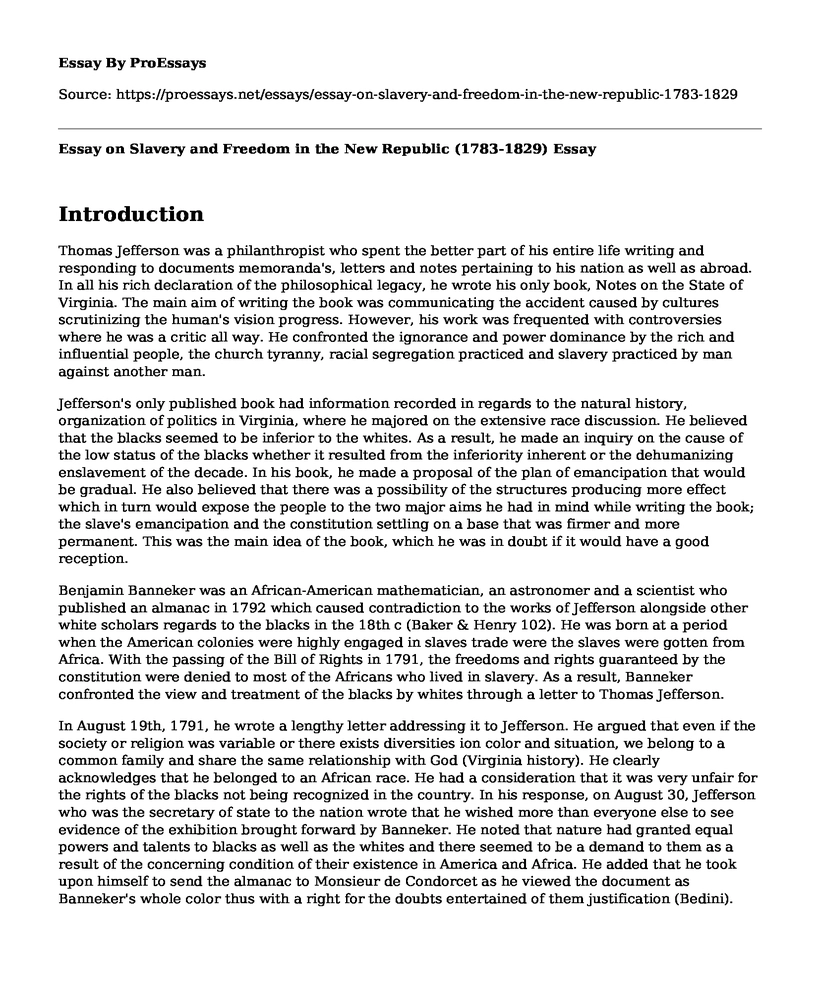Introduction
Thomas Jefferson was a philanthropist who spent the better part of his entire life writing and responding to documents memoranda's, letters and notes pertaining to his nation as well as abroad. In all his rich declaration of the philosophical legacy, he wrote his only book, Notes on the State of Virginia. The main aim of writing the book was communicating the accident caused by cultures scrutinizing the human's vision progress. However, his work was frequented with controversies where he was a critic all way. He confronted the ignorance and power dominance by the rich and influential people, the church tyranny, racial segregation practiced and slavery practiced by man against another man.
Jefferson's only published book had information recorded in regards to the natural history, organization of politics in Virginia, where he majored on the extensive race discussion. He believed that the blacks seemed to be inferior to the whites. As a result, he made an inquiry on the cause of the low status of the blacks whether it resulted from the inferiority inherent or the dehumanizing enslavement of the decade. In his book, he made a proposal of the plan of emancipation that would be gradual. He also believed that there was a possibility of the structures producing more effect which in turn would expose the people to the two major aims he had in mind while writing the book; the slave's emancipation and the constitution settling on a base that was firmer and more permanent. This was the main idea of the book, which he was in doubt if it would have a good reception.
Benjamin Banneker was an African-American mathematician, an astronomer and a scientist who published an almanac in 1792 which caused contradiction to the works of Jefferson alongside other white scholars regards to the blacks in the 18th c (Baker & Henry 102). He was born at a period when the American colonies were highly engaged in slaves trade were the slaves were gotten from Africa. With the passing of the Bill of Rights in 1791, the freedoms and rights guaranteed by the constitution were denied to most of the Africans who lived in slavery. As a result, Banneker confronted the view and treatment of the blacks by whites through a letter to Thomas Jefferson.
In August 19th, 1791, he wrote a lengthy letter addressing it to Jefferson. He argued that even if the society or religion was variable or there exists diversities ion color and situation, we belong to a common family and share the same relationship with God (Virginia history). He clearly acknowledges that he belonged to an African race. He had a consideration that it was very unfair for the rights of the blacks not being recognized in the country. In his response, on August 30, Jefferson who was the secretary of state to the nation wrote that he wished more than everyone else to see evidence of the exhibition brought forward by Banneker. He noted that nature had granted equal powers and talents to blacks as well as the whites and there seemed to be a demand to them as a result of the concerning condition of their existence in America and Africa. He added that he took upon himself to send the almanac to Monsieur de Condorcet as he viewed the document as Banneker's whole color thus with a right for the doubts entertained of them justification (Bedini).
References
Baker, Henry E. "'Benjamin Banneker, the Negro Mathematician, and Astronomer." Journal of Negro History 3 (1918): 98-118.
Bedini, Silvio. The Life of Benjamin Banneker. New York: Charles Scribner's Sons, 1971.
Virginia history. "Virginia Museum of History & Culture." Thomas Jefferson and the Virginia Statute for Religious Freedom | Virginia Museum of History & Culture Thomas Jefferson and the Virginia Statute for Religious Freedom, www.virginiahistory.org/collections-and-resources/virginia-history-explorer/thomas-jefferson.
Cite this page
Essay on Slavery and Freedom in the New Republic (1783-1829). (2022, Jun 19). Retrieved from https://proessays.net/essays/essay-on-slavery-and-freedom-in-the-new-republic-1783-1829
If you are the original author of this essay and no longer wish to have it published on the ProEssays website, please click below to request its removal:
- Essay Sample on Thomas Jefferson: Hypocrite or Statesman
- Bartolome de las Casas: New World Social Reformer Annotated Bibliography
- Essay Sample on World War II Generation
- 19th Century US: Second Great Awakening & Abolition of Slavery - Essay Sample
- WW1: US Emerges as Superpower After Global Conflict - Essay Sample
- Essay Example on Nurses' Ethics: A Grim Reminder During Nazi Era
- 2020 Campaign: Exploiting Partisan Divide to Create Division - Free Paper Sample







